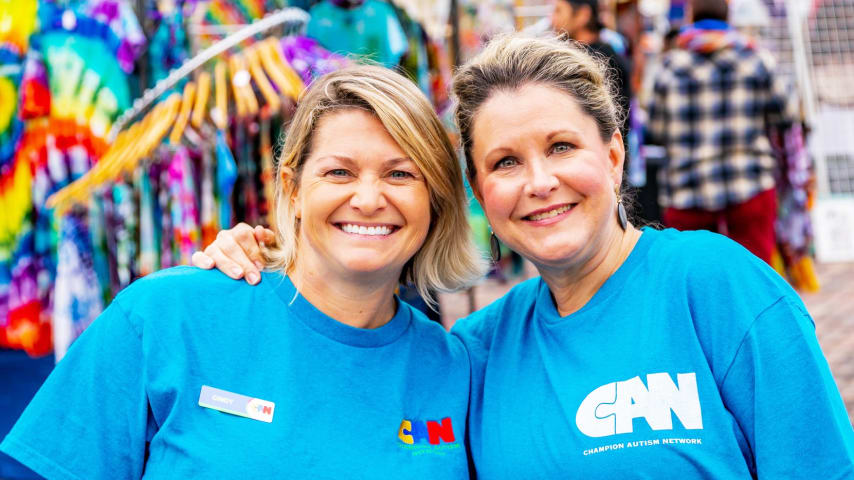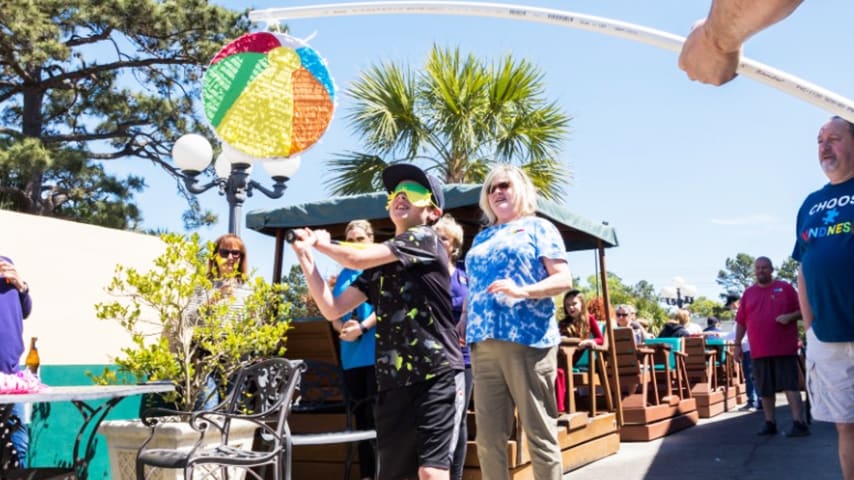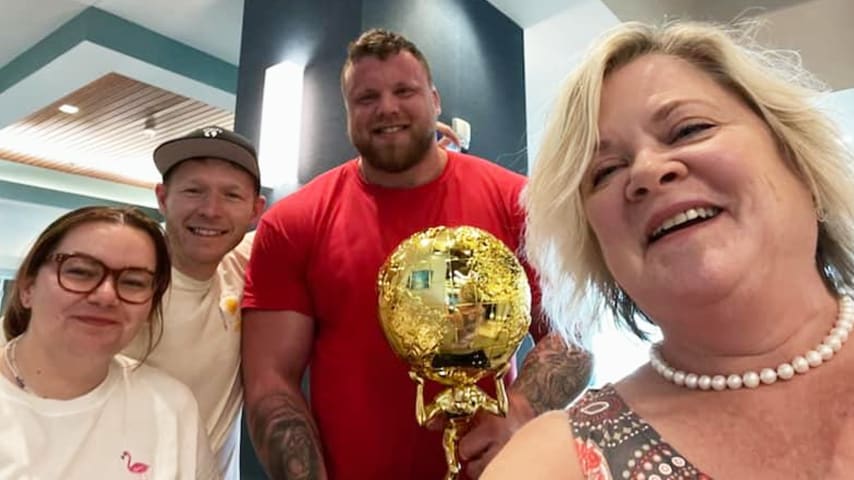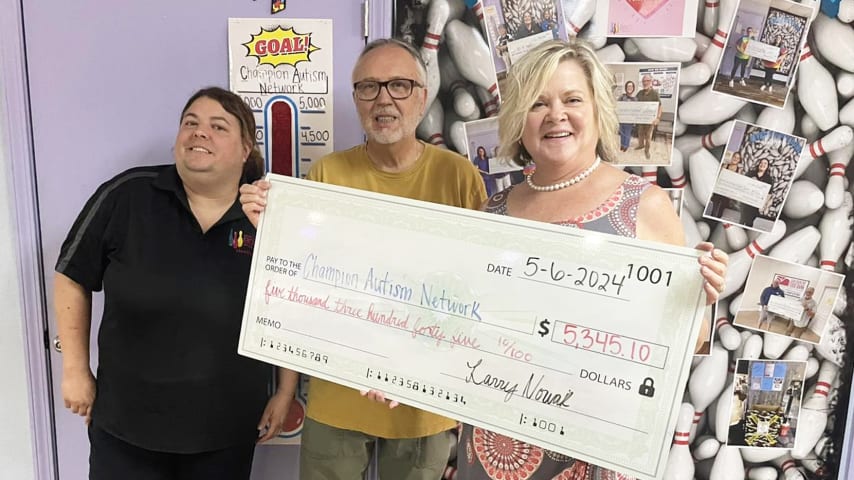Myrtle Beach becomes certified autism-friendly travel destination through Champion Autism Network
5 Min Read

Volunteers of Champions Autism Network. (Courtesy Champions Autism Network)
The goal, Becky Large will happily tell you, is “world autism awareness domination.”
She started with Surfside Beach, South Carolina, in 2013 after relocating there from New Jersey. Large knocked on doors, met with business leaders and came up with innovative events to help families like hers impacted by autism feel supported.
The Champion Autism Network (CAN) was so successful that in 2016 Surfside Beach became its first certified autism-friendly travel destination. The City of Myrtle Beach, which the PGA TOUR visits this week, and Horry County followed two years later.
Now, vacation spots in Texas, Florida and Oregon are interested in making families impacted by autism -- some 80% of whom don’t travel due to the challenges -- feel more comfortable and welcome in the community. And CAN is even going international.
“I'm working with an organization in Nairobi, Kenya right now to develop our first autism awareness module in Swahili to educate the parents and teachers and political officials,” Large says.

The Champions Autism Network advocates for world autism awareness. (Courtesy Champions Autism Network)
This week’s Myrtle Beach Classic is one of the many local events and attractions supportive of CAN’s mission. Not only will the organization receive a much-needed grant from the event, the tournament is hosting a a sensory-friendly event at PopStroke, one of a chain of putting courses that is co-owned by Tiger Woods.
Four young adults with autism and two of their parents will be joined at the event on Wednesday by TOUR pros Wilson Furr, Lanto Griffin and Scott Gutschewski. Large is grateful for the increased visibility, as well as the grant, which she says gives her hope.
“It is just a tremendous shot in the arm, and not just financially, but to have the opportunity to get involved with the PGA (TOUR) and golf, which could be a wonderful sport for people with autism because team sports are difficult (for them),” she says. “This kind of thing, it could be good for so many people.”
Autism is a neurological developmental disorder that impacts social interaction, the ability to communicate and repetitive behaviors, according to the National Autism Association. It’s the fastest growing developmental disorder, affecting one in every 36 children, and disproportionately affects males, 4 to 1, over females. Approximately 40% of children with autism are non-verbal.
Lights and loud noises and big crowds can trigger meltdowns in people with autism. Large says some people might see someone having a tantrum and think they are a spoiled child when that person is simply trying to express frustration or displeasure.
“Actually, this is a family in crisis, and we need either love or people that protect us,” Large says. "As you learn more about autism and how it impacts the family unit, then the family doesn't want to leave the house because everybody's judging them.
“So, I try and curate environments so that there's less sensory stimulation for the person with autism, and the family can all come out and play, because if everybody stays home, that's not good for anyone. The siblings, oh my gosh, life for the siblings, especially the younger ones with people on the spectrum is really challenging and difficult.”

Becky Large (right) with Tom Stoltman, who is on the autism spectrum and won the World’s Strongest Man title in Myrtle Beach. (Courtesy Champions Autism Network)
CAN works with restaurants like Myrtle Beach stalwart Johnny D’s Waffles and Bakery to heighten awareness of autism. When there’s a wait, families with an autistic member can show their CAN Autism Travel Card and go to the head of the line. Their order is expedited, and the staff knows where to seat the family and how to treat them with respect. The chef has a son on the spectrum, and the menus feature information about autism.
Among the events CAN sponsors are its flagship monthly movies, as well as birthday bowling bashes. Large can’t remember exactly when she started the film nights, but she does know the first one only drew 12 people. Now between 100-200 attend the free event each month.
“It’s a great gateway activity because there’s not a lot of social interactions,” Large says. “So, the lights are up, the sound is down and the people are free to move around. So, it's not your traditional movie viewing experience, but our families love it. Everybody gets it. Your kid can scream, spin, yell, cry, whatever.”
Melissa Montgomery’s 23-year-old son, Colin, who is on the autism spectrum, was the official greeter at the movies when he was a kid – an activity that eventually turned into his first job. Over the years, the family has taken advantage of many CAN programs and affiliated businesses, like Ripley’s Aquarium of Myrtle Beach.
“They definitely know, and they're trained, and you just show them your CAN card,” Melissa says. “The aquarium is very peaceful for him. So, if we're having a day where I'm like, he might not be having his best day, we'll go and do that.”

Becky Large (right) started Champion Autism Network in Surfside Beach. (Courtesy Champion Autism Network)
Colin will be playing putt-putt at PopStroke with his dad, Scott. His twin brother, Conner, who is in law school in Kentucky, is coming home to watch the first PGA TOUR event ever held on the Grand Strand. He played golf in high school and their younger sister Kenley is currently doing the same. The family plans to head to the Dunes Club on Saturday, although Melissa isn’t sure how Colin will handle the crowd.
“That will be one where I’ll drive separate and we will probably leave,” she says.
Melissa says she looks for programs like CAN – which has a travel app -- when she and her husband plan family vacations. She tries to fly through airports with sensory-friendly areas or decompression rooms. And she’s always hoping to find the welcoming atmosphere provided by businesses and attractions that Large and CAN have helped to educate in Myrtle Beach.
“It's just been huge for our family,” Melissa says. “ I always know that Becky is fighting for people to understand our kids and to give them a safe place to go and just know that, okay, these people are not going to judge us.”
